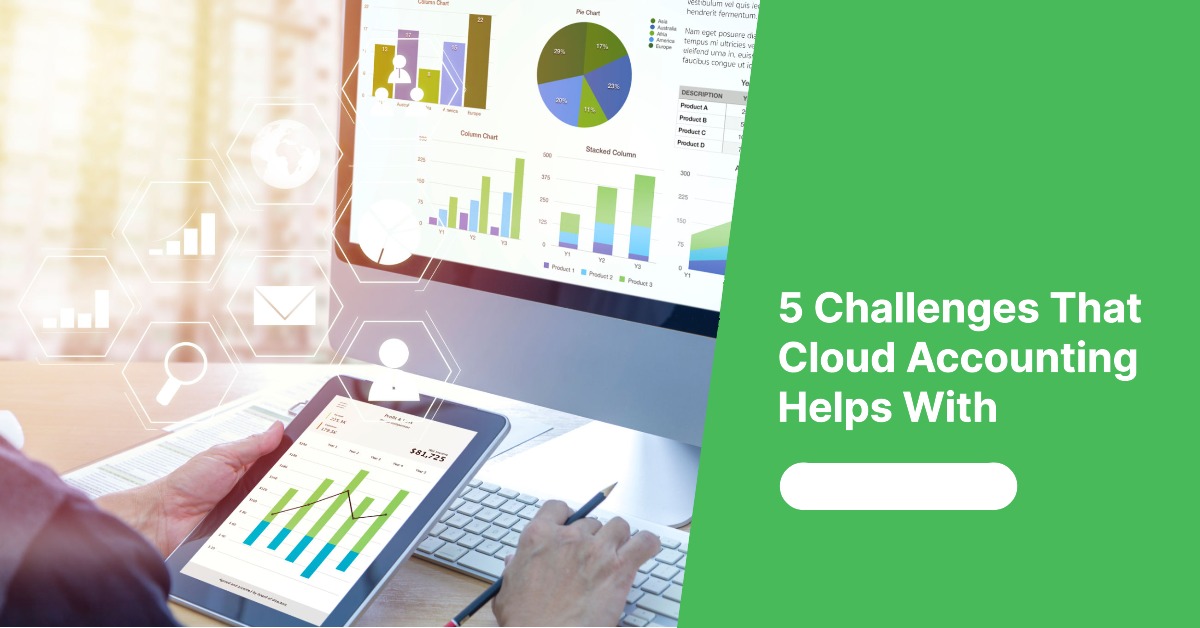The evolution of cutting-edge technology is revolutionizing the way business approach their tasks. Outdated methods are not viable options in today’s modern tax reports and complex accounting data. Additionally, relying on age-old methods now increases employee burnout rate and affects your workflow. This also leads to inefficient accounting that contains errors and invalid data.
Therefore, cloud accounting is being implemented in every modern-day business. Cutting-edge technology is making accountants’ lives easy by providing them with features and options to handle complex tasks. Additionally, it keeps your accountants productive with its strong accounting capabilities that automate most of the manual tasks. This decreases the chances of critical errors that directly impact your organization’s revenue.
Want to know how modern-day accounting helps? Here are 5 challenges that cloud accounting helps with.
Why Cloud Accounting Instead of Traditional?
Cloud accounting offers advanced functionality options to change your accounting methods for the better. It helps with the automation of repetitive tasks, provides more collaborative features, hardens your data security, and more. Additionally, this allows employees to focus on more strategic work rather than spending all their day on paperwork. It also keeps track of your data to help you find weaknesses in your accounting department and implement new strategies.
1. Inability to Access Data Remotely
One of the most commonly faced challenges in traditional accounting is the inability to access data remotely. In most organizations, to access your accounting, your CPAs (Certified Public Accountants) must always be present in the office. With their unavailability, you wouldn’t be able to gain access to your accounting operations.
This is crucial because there are often many urgent situations where you would have to perform critical on-hold tasks. Considering this, organizations use Xero accounting software to enable them to access their data even on the go. This allows you to perform quick actions without relying on your CPAs and also outside your working hours.
2. Higher Operational Expenses
High operational expenses can be crucial for thriving new businesses that can’t keep their finances in control. With traditional accounting, you would need to invest in multiple computers, software, and in-house servers. Additionally, you will also need an IT team to take care of the technical aspects of your workplace.
The reason why cloud accounting implementation is preferred is because it offers tailored solutions according to your needs. This flexibility allows business owners to choose only the services they need and pay for them. Eventually, it will help you to cut extra expenses and continue your accounting processes without significantly impacting your revenue.
3. Address Downtime Problems
In old-school accounting methods, you solely rely on your computers to work 24/7. This isn’t always the case, as computers can stop being functional due to technical errors or system malfunctions. This affects the continuity of your daily accounting operations and holds some of the critical tasks. Without performing crucial tasks on time, it can lead to negative impacts.
Additionally, frequent downtime issues in the accounting department can affect the efficiency of your workforce. Cloud accounting minimizes such risks by keeping all your data on the cloud servers. Fortunately, solution providers know that downtime can directly lead to loss of money in a number of ways. Therefore, they ensure 100% uptime and prevent servers from going down.
4. Ease of Data Management
Accountants are often required to filter data and find out crucial information that is currently demanded. This requires accountants to work together on the data to filter out the required reports to present in the concerned department. Working on multiple files of the same data can create a lot of complications for your CPAs.
However, when all your data is stored in the cloud, it can be accessed by authorized users. This lets accountants edit or view the files anytime they want. Also, it eliminates the need to use multiple files and store them on different office computers. Additionally, it also allows your employees to collaborate on the same files stored in your cloud server simultaneously.
5. Alleviates Data Loss Risk
Most of the company’s critical accounting data is stored inside the local computers. This raises security concerns as the security of these computers can easily be breached by cybercriminals. Additionally, the data can be accessed by anyone who can use the computer, which can lead to the loss of confidential information. Moreover, the lost data can’t be recovered.
Imagine losing all your accounting information without having any backups. It is awful to imagine, as it can lead to setbacks and affect the continuity of your accounting operations. Therefore, to alleviate these risks, businesses use cloud-based accounting like Xero to address these concerns effectively. These solution providers use security measures such as data encryption, deploying firewalls, and other protective layers to safeguard your data.
How Can You Get Your Personalized Account Software?
Gain more control over your accounting department with the feature-rich interface and multiple interactive options. Automate manual tasks, reduce paperwork, view financial reports, and supervise the activities of your accountants. Get all these features in a single centralized accounting platform. Contact a professional accounting service provider now to get a perfect solution that caters to your unique needs.
Learn more:
Understanding the Basics of Bookkeeping and Accounting
Integrating Purchase Order Forms into Your Accounting System

